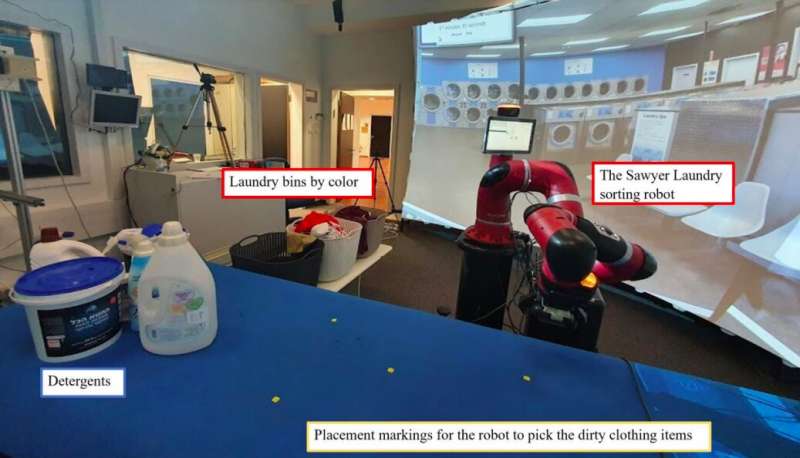
Over the past few decades, roboticists and computer scientists have developed increasingly advanced systems that can interact with humans and complete numerous everyday tasks. While robots are rapidly advancing, for humans to effectively start using them they should be able to trust in their abilities and find them helpful and appealing.
Researchers at Ben-Gurion University of the Negev, in Israel, have recently carried out a study examining some of the factors that might affect how much humans trust, like and are willing to use robots. Their paper, pre-published on arXIv, specifically looks at the impact of personally relevant robotic failures, or PERFs, which are essentially technical issues that are particularly salient or relevant to specific users.
To test the extent to which PERFs affect users’ perceptions of collaborative robots, the team carried out three laboratory experiments. In the first experiment, a collaborative robot trained to help with making laundry damaged personal property, in the second it caused financial losses, and in the third it wrongly identified the gender of humans.
More specifically, in the first experiment the mobile robot threw an item of clothing, either belonging to a study participant or the experimenter, on the floor or threw it into a trash can. In the second experiment, the robot moved slowly, got stuck, dropped a bottle on the floor, made weird noises and took an inefficient route to reach a desired location. Finally, in the third experiment, the laundry-assistance robot wrongly identified the gender of either the participant or the experimenter.
“In total, 132 participants engaged with a robot in person during a collaborative task of laundry sorting,” Romi Gideoni, Shanee Honig and Tal Oron-Gilad, the three researchers who carried out the study, wrote in their paper. “All three experiments took place in the same experimental environment, which was carefully designed to simulate a realistic laundry sorting scenario.”
Interestingly, Gideoni, Honig and Oron-Gilad found that the impact of PeRFs on the participants’ perceptions of the laundry-sorting robot varied significantly across the three experiments. In the first two experiments, where the users experienced property damage or financial losses, failures appeared to significantly impact their trust in the robot, compared to trials in which they experienced no failures. In the third experiment, on the other hand, where the robot mis-identified their gender, failures did not appear to impact their overall view of the robot.
“The work highlights challenges and adjustments needed for studying robotic failures in laboratory settings,” the researchers explained in their paper. “Putting personal relevance aside, we observed differences in the way users perceive interaction failures compared (experiment C) to how they perceive technical ones (A and B).”
The recent findings gathered by this team of researchers suggest that when a robot’s failures personally affect users, they might have a greater impact on the extent to which users trust a robot and are willing to use it in their everyday life. In the future, these interesting observations could fuel further studies examining the impact of other types of failures on trust in robots, as well as their perceived severity in the eyes of users. In addition, the recent study could inspire the development of new systems that can drastically reduce the PeRFs of different robotic platforms.
Humans interacting with robot found to mimic and synchronize with its movements
Is it personal? The impact of personally relevant robotic failures (PeRFs) on humans’ trust, likeability, and willingness to use the robot. arXiv: 2201.05322 [cs.RO]. arxiv.org/abs/2201.05322
© 2022 Science X Network
Citation:
Study examines the effects of personally relevant robotic failures on users’ perceptions of collaborative robots (2022, February 9)
retrieved 9 February 2022
from https://techxplore.com/news/2022-02-effects-personally-relevant-robotic-failures.html
This document is subject to copyright. Apart from any fair dealing for the purpose of private study or research, no
part may be reproduced without the written permission. The content is provided for information purposes only.
Credit: Source link





















